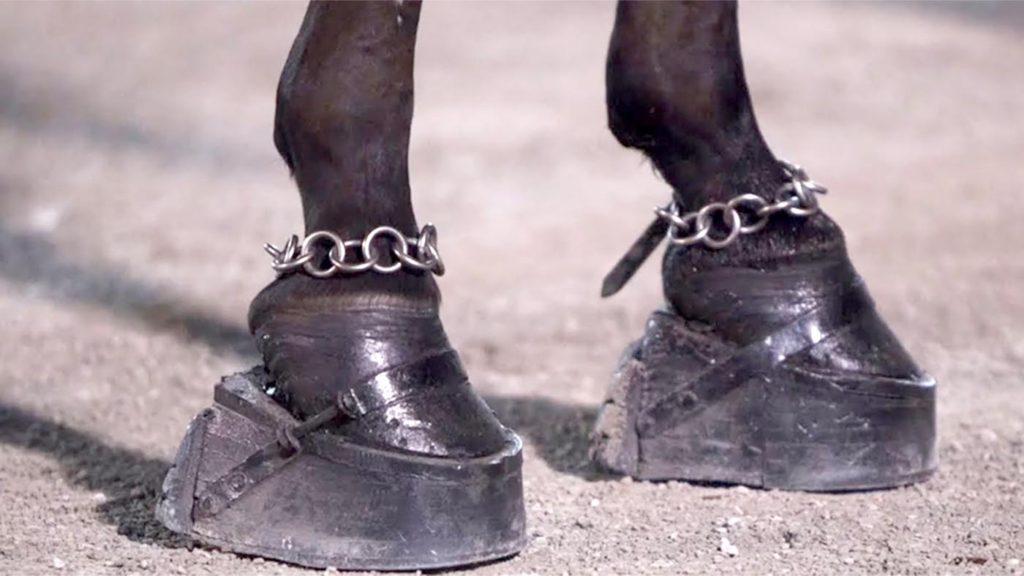While the nation is grappling with the COVID-19 crisis and seeing major protests in response to the killing of George Floyd, animal protection advocates continue to grapple with the various crises and abuses that those we work to protect face each day, including the ongoing mistreatment of Tennessee Walking Horses. I’ve been working for the past decade — first within the industry as president of the breed registry and now as executive director of Animal Wellness Action — to end the scourge of soring, which involves intentionally inflicting pain to horses’ legs and hooves to produce an artificial high-stepping gait known as the “big lick.”
At the beginning of the show season in Tennessee, we generally see a rise in the debate and rhetoric regarding the use of large stacked shoes and ankle chains placed on the horses feet to exacerbate the pain they feel from the application of caustic chemicals such as diesel fuel, mustard oil, and croton oil. There’s also a long game of tug-o-war between the owners and trainers of “big lick” horses and the inspectors from the U.S. Department of Agriculture, which is charged with enforcing the Horse Protection Act that was designed to stamp out the abuse.
The “big lick” faction believes the USDA’s treated them unfairly, and that the inspection system is very subjective. Those of us vocal against the “big lick” believe that since Secretary Sonny Perdue took the reins of the Agency, very little has been done to curb the abuse. Perdue’s allowed trainers who’ve signed consent decisions for violations of soring to continue showing this year: given just a slap on the wrist and a future suspension set to begin when they’re ready to retire. One thing is certain, and we all agree: the current system has failed.
And now, it’s showtime again, albeit a few months later than we’re generally accustomed to. This weekend, the Tennessee Walking Horse “big lick” show season kicked off in Columbia at the Maury County Park. And while most people in the Volunteer State are unaware of the drama playing out over the abuse of the horses, a Citizens’ Campaign Against Big Lick Animal Cruelty positioned protesters from Tennessee at the gates of the show for the sixth year in a row.
These advocates have successfully pushed municipalities to disallow “big lick” events in their domains, and they’ve been quite successful eliminating traditional pain-based shows full of soring from Jackson, Mississippi; Panama City Beach, Florida; and the North Carolina State Fair. They have continued to exercise their Constitutional right to peacefully protest events in public, and the wagons are circling and driving the majority of walking horse abusers across the nation into a five or six county area centered around Shelbyville.
One of the most prominent violators of the Horse Protection Act, Russ Thompson, who sored horses just outside of Los Angeles since the 1980’s, has now become a permanent fixture in Bedford County. This marks the end of the last pocket of soring in the nation’s largest state.
The good news is change may come. The Prevent All Soring Tactics (PAST) Act, H.R. 693/S. 1007,which would ban the large stacked shoes and ankle chains, and eliminate the current inspection system, passed the U.S. House last July with 333 “yes” votes including U.S. Reps. Tim Burchett (R-Knoxville), Jim Cooper (D-Nashville), and Steve Cohen (D-Memphis). The walls are closing in on the legislators and coalition who’ve long worked to block the bill, and I believe they are beginning to see the light. The Senate companion bill now has 52 Members signed on as cosponsors, and we’re pushing harder than ever for a debate and vote.
And last month, Monty Roberts — “the man who listens to horses,” who has trained the horses in Her Majesty Queen Elizabeth II’s stable for decades — recommitted his efforts to help us end soring and save the Tennessee Walking Horse breed. He first visited Shelbyville, and the Tennessee Walking Horse National Celebration fifteen years ago and tried to help the breed step soundly into the future but met great resistance at the time. He’ll provide us with an opportunity to educate those steeped in the soring culture in the ways of natural and non-violent horsemanship.
Change must come. The breed and the industry are withering because the public is onto them and the cruelty to the horses. Crowds are shrinking, the number of registered horses receding, and young people taking their enthusiasms for sport elsewhere. If the leaders of the industry don’t embrace reform, they may be left with nothing at all. A once thriving industry in Tennessee will pass away, and it will be due to a stubborn refusal of its leaders to adapt to a world that recognizes the health and well-being of the horses should have been at the center of the industry’s agenda.
From the looks of what we saw on video at the “big lick” show this weekend, the horses appeared to be plenty sore, and USDA failed to protect the horses once again. Please take action today by clicking here to tell USDA’s Animal Plant and Health Inspection Services Administrator Kevin Shea to send USDA inspectors the next “big lick” show that’ll be held in Shelbyville in two weeks.
Marty Irby is the executive director of Animal Wellness Action in Washington, D.C. and past president of the Tennessee Walking Horse Breeders’ & Exhibitors’ Association
